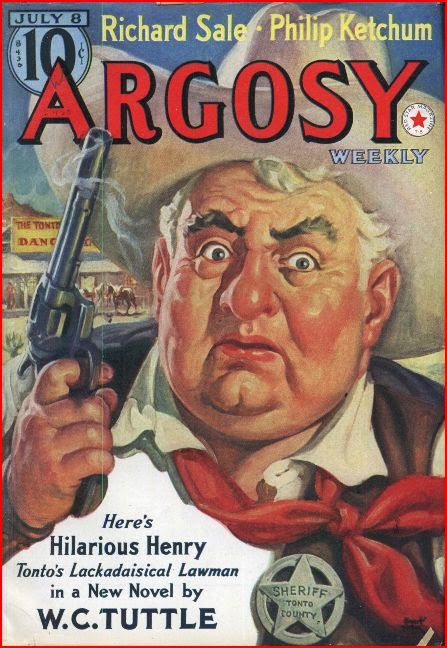
Since Argosy is still reprinting A. Merritt's Seven Footprints to Satan, that leaves Walter Ripperger's "The Man From Madrid" on the serial front. By now the Spanish Civil War has almost nothing to do with the story of stolen treasure, which has become a three-way battle of wits involving our hero, his ruthless ally Mr. Nibbs, and the surviving member of the group that stole the treasure. This penultimate installment finds Ripperger in endgame mode, teasing a shift in alliances as each player weighs the best way to get the biggest share of the loot, while the smarter-than-he-acts policeman struggles to piece the plot together. Ripperger does this sort of intrigue and psychological warfare fairly well and his story remains one of the year's better serials.


Our above-the-title writers this week should be familiar names by now. Philip Ketchum's "Scourge of the Severn" is the latest in his Bretwalda cycle, and his weakest story so far. The latest wielder of the mystic axe helps Henry Plantagenet win the English throne and wins a bride for himself to make up for the defeats and sorrows to which Bretwalda's owners are doomed. Ketchum doesn't do much to make the period interesting and really seems to have phoned this one in. Richard Sale closes the issue with a grim short, "I Want to Be Like Lefty." It's the rise and fall of a young fighter who despite his skills shuns scientific boxing to slug things out like his idol, not knowing that Lefty ended up punch-drunk in a sanitarium, as he himself will.

Meanwhile, Arden X. Pangborn brings back the crafty Chinatown jeweler Wong Soo, who in "The Eye of the Crow" solves a masked robbery of the archetypal charity collection, for which an innocent man is framed. As usual, Wong Soo proves himself a better detective than the white cops assigned to Chinatown, showing up their obvious racism even while Pangborn's stories are arguably racist themselves in their stereotypes of Chinatown. Louis C. Goldsmith, a rising Argosy star, has a decent novelet, "We're Running Line," about hazardous surveying work subject to sabotage. This was a big improvement on the last Goldsmith story I read, but I felt handicapped in my appreciation by my ignorance of surveying. I have to assume that Argosy's target readership was more familiar with the jargon of the job than, say, the average paperback reader would be today. Obviously Goldsmith felt no need to explain exactly what the surveyors were doing, but you don't need to know all the details to get the drama of the story. Last if not least, William Foster Elliot makes his Argosy debut with "Ten-Thirty and Red," a trifle about an undercover cop infiltrating a drug ring. This issue was an improvement on last week, with Ketchum the weakest link and the Tuttle not exactly awful. Next week Robert Carse brings the Foreign Legion to 19th century Mexico and "The Man From Madrid" concludes. Stay tuned.
TO BE CONTINUED
No comments:
Post a Comment